Pouches: Why Your Baby Doesn’t Need to Suck Pureed Food Out of Pouches with @msdawnslp Dawn Winkelmann, MS, CCC-SLP
- Why we want babies to transition past purees when they're learning how to eat...and what a baby stuck on purees
- Why pouches promote suckling (an immature swallowing pattern) at the very time we want them to develop a mature pattern (chewing and swallowing)
- Why pouches aren't as healthy as they purport to be and why their persistent use can actually inhibit your baby's ability to achieve their growth, developmental and nutrition milestones.
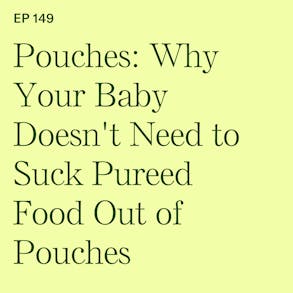
LISTEN TO THIS EPISODE
Episode Description
What are the drawbacks of using baby food pouches? In this episode I’m joined by pediatric swallowing expert and speech language pathologist Dawn Winkelmann, MS, CCC-SLP to talk about why your baby does not need to suck puree food out of a pouch. Ms Dawn and I are breaking down the limitations of pouches from cost, developmental and nutrition standpoints. While pouches are certainly convenient, their persistent use can actually inhibit your baby’s ability to achieve certain growth, nutrition and developmental milestones.
Links from this Episode
- Baby-Led Weaning with Katie Ferraro program with the 100 First Foods™ Daily Meal Plan, join here: https://babyledweaning.co/program
- Baby-Led Weaning for Beginners free online workshop with 100 First Foods™ list to all attendees, register here: https://babyledweaning.co/baby-led-weaning-for-beginners

Latest Episodes
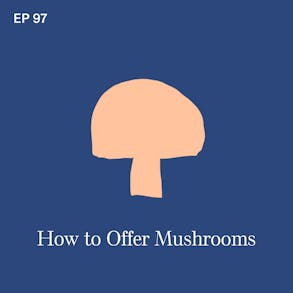
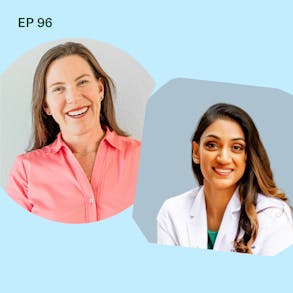
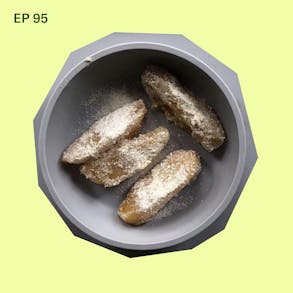
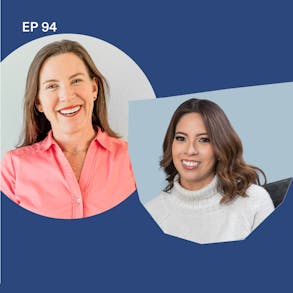

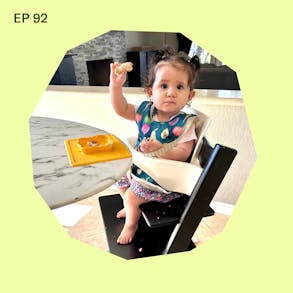
Dawn Winkelmann (0s):
But if we give them a plastic pouch where they can't see the food, they can't smell the food. They can't touch the food. They can't hear the food. Then we're essentially stripping away. Baby's sensory exposure at mealtime.
Katie Ferraro (15s):
Hey, there I'm Katie Ferraro, registered dietician, college nutrition, professor and mama seven specializing in baby led weaning here on the baby led weaning made easy podcast. I help you strip out all of the noise and nonsense about feeding, leaving you with the competence and knowledge. You need to give your baby a safe start to solid foods using baby led weaning. Well, Hey guys, and welcome back to, they Were talking about pouches and why your baby does not need to suck pureed foods out of pouches today. I'm being joined by my good friend and feeding expert colleague, Don Winkelman.
Katie Ferraro (55s):
Don is on social @msdawnslp. She's a speech language pathologist. She is a specialist in pediatric swallowing. She's also the feeding expert for easy peasy. So they're the company that makes the Silicon suction mats and bowls. She also designs all of their baby led weaning spoons and open cups. And she is going to talk you out of doing pouches. If you're on the fence about it, I'll be sharing from a nutrition standpoint, why they are inferior to real foods. When we're starting solids with our babies and Dawn, we'll be talking about why from a developmental standpoint, pouches are not recommended. And Dawn and I have an opportunity to teach and work together a few times each year. I absolutely love co-teaching with her.
Katie Ferraro (1m 36s):
And we actually have a series of live free online workshops coming up. If you guys are interested in learning from Don and I about giving your baby a safe start to solid foods, we're doing a workshop called what do I feed my baby after avocado banana and sweet potato? Because we know you guys get like gung ho at the beginning of baby led weaning. And you can do those simple starter foods like avocado, banana and sweet potato, but we sometimes see our parents get stuck in. The last thing we want is for you to give up on baby led weaning and go back to doing pouches or you're doing baby led weaning, but then you think you need to shove a pouch in your baby's mouth at the end of the meal, just so they get enough. We're going to show you as to baby led weaning experts, how to push your baby's palette beyond those simple starter foods.
Katie Ferraro (2m 19s):
So if you want to sign up for our free online workshop again, it's called, what do I feed my baby after avocado banana and sweet potato head to baby led weaning workshop.com. We've got a number of different dates and times coming up again. These are all live, choose one that works for you. We do a huge live Q and A at the end of it. It's such a fun experience in such a great way for you to feel confident in you and your baby's ability to move past those simple starter foods. So again, that site is baby led, weaning workshop.com. Get signed up for the workshop. Hopefully we'll see you there. And with no further ado, let's dive into pouches and why your baby doesn't need to suck pureed food out of houses. This is an interview with Ms. Dawn SLP Winkelman.
Katie Ferraro (3m 1s):
Well, hi, Dawn. Welcome back. And thank you so much for joining us again today.
Dawn Winkelmann (3m 5s):
Thank you so much for having me again, Katie.
Katie Ferraro (3m 7s):
All right. Before we get started, I just want to clarify, this is not an anti pureed food episode. Dawn. You're always teaching us and talking about how purees are an important texture for babies to master, but they're just not like the only texture that babies can handle. So can you start us out before we transition into talking about pouches? Like a lot of people think babies can only eat pureed foods. Would you set us straight on this whole texture train and maybe share some reasons why we want babies to experience textures beyond purees?
Dawn Winkelmann (3m 39s):
Yes. Happy to. We want babies to move past purees because we want to be able to see of a baby can transition past purees. I need to see if a baby can have baby led weaning strips of food and not be stuck on purees. Usually when babies are stuck on purees, that's a big red flag for me as a feeding specialist that a baby may have an oral motor delay or an underlining medical diagnosis like reflux or a swallowing disorder, or a sensory aversion to certain textures. When adults offer a baby a puree, they tend to just feed baby instead of allowing the baby to actually from a developmental standpoint, feed themselves independently.
Dawn Winkelmann (4m 19s):
So when we consistently put food into their mouth, they're missing out on those key developmental milestones that can actually delay their overall development. But of course, periods are a part of a texture continuum that is important for babies to be exposed to.
Katie Ferraro (4m 34s):
So Dawn, I know we do a lot of work in trainings and courses together, and as I feel like you're a dietician sidekick. So I just feel obligated to state in an episode about pouches that from a nutrition standpoint, pouches are almost always just watered down versions of foods that your baby could be eating in a safe, real whole food experience, IE, its intact form. So I know like they just irked me so bad because pouches are essentially expensive green colored applesauce. Like currently my baby's eating kale when they buy a green pouch, but guys, that's not kale. That's apple sauce with a tiny bit of kale in it and I'm joking, but I'm not because you and I spend so much time teaching parents how they can safely feed their babies real food.
Katie Ferraro (5m 15s):
So outside of the cost and the nutrition drawbacks of pouches from your side, could you tell us what are the drawbacks of babies sucking food or purees out of pouches?
Dawn Winkelmann (5m 27s):
The biggest drawback for me is that they don't promote a healthy development of feeding and swallowing skills. So pouches encourage cycling, which is an immature swallowing pattern. We want babies to learn a mature swelling pattern of chewing and swallowing just like you and I do when babies are consistently given pouches, they tend to have trouble progressing the finger foods and usually need to see me for feeding therapy. So we know that studies show that a late introduction of soft, appropriately sized strips of food is associated with picky eating and other feeding difficulties leader in a baby's life. And this can happen when babies are given pouches so frequently, if it's an occasional, you know, pouch here or there, I just asked families to pour that into a bowl or offer it onto a baby led spoon.
Dawn Winkelmann (6m 17s):
And then we don't have all those drawbacks of, you know, the difficulties of, you know, advancing feeding skills and advancing swallowing skills.
Katie Ferraro (6m 26s):
And just to clarify, Dawn, you're always talking about feeding milestones and we talk about nutrition, milestones in your area as a pediatric swelling expert in a speech language pathologist. Can you confirm or deny what, is there any feeding milestone associated with your baby needing to know how to suck out of a plastic pouch?
Dawn Winkelmann (6m 44s):
No. No. So when we're really focusing on starting solids at six months of age, we are focusing on this huge milestone of change in swallowing and development. And that is the tongue is going up to the roof of the mouth and being able to swallow successfully and having this more mature experience instead of just suckling with that tongue thrust going in and out. So many families are saying, you know, I, my baby is still, you know, having the tongue thrust that's going in and out, I'll usually say, are you still drinking out of pouches? Like what is the cause of this continued delay of development of that tongue? And it's usually something that has to do with sippy cups or pouches, which I know we've talked about sippy cups and pass episodes.
Katie Ferraro (7m 30s):
And I'm going to share A link to an episode that we did together. It's actually one of our most downloaded interview episodes with Don. Its called six reasons to skip the sippy cup and that'll be hooked up at the show notes for this episode. If you guys go to BLW podcast.com. Now, Don let's talk about the sensory experience of learning, how to eat. I love that you always described the learning, how to eat processed is like the most sensory thing your baby will ever do. But how do pouches interfere with the sensory aspects of learning, how to eat? And then how can substituting like actual meals for food pouches? Like instead of doing meals, we're doing couches all the time. How does that affect or impact a baby sensory or developmental skills?
Dawn Winkelmann (8m 7s):
Yes, eating is the most enjoyable sensory experience. A baby has the opportunity to experience in their lifetime. But if we give them a plastic pout where they can't see the food, they can't smell the food, they can't touch the food, they can't hear the food. Then we're essentially stripping away. Baby's sensory exposure at mealtime, and this can result in poor eating habits. It can result in food refusals. And it's really important for us to understand why that can happen is because they're eating directly out of a plastic container and really not falling in love with kale. Like you were just giving that example earlier. Like they're not falling in love with kale. They're falling in love with this plastic pouch that they can swallow so easily because they're using a swelling pattern.
Dawn Winkelmann (8m 54s):
That is an immature pattern. We want them to be able to have the sensory experience of touching that food and hearing how that food is moving around into their mouth, seeing the food, smelling the food. So then they're really building a relationship with that food, not a relationship with manufactured products
Katie Ferraro (9m 11s):
And people. Sometimes I know our audience struggles so much with feeding meats to your baby. If your family eats animal foods and you know, the importance of introducing high iron and zinc foods like meat and parents, sometimes we'll find a pouch brand. That's mostly meat and be like, yeah, but I'm going to do this one. It's still the same thing that oftentimes tends to be from the developmental standpoint is Dawn's explaining not unnecessary development that your baby needs to suck meat out of a pouch. But from a nutrition standpoint, they're not getting oftentimes the same amount of nutrition. If it's a watered down product, you're not getting the texture associated with meat. I mean, Dawn and I have so many resources to show you how to make foods like meat safe for your baby to eat, not to mention that some of these pouches are really expensive, right? Like one particular brand is upwards of $4 now in the refrigerated section at target.
Katie Ferraro (9m 55s):
And if you break that down cost for costs, it's not even truly a true serving of fruits or vegetables for the babies. It ends up to be such a more expensive way to introduce your baby to something that's not even real food, not nutritionally appropriate or complete for your baby. And certainly not meeting all of those feeding and texture milestones that Don talks about. So I know we're kind of preaching to the choir always though when we do these episodes, because they're listening to a baby led weaning podcasts, if they've ever heard you and I teach together, we say, yes, pouches aren't necessary, but why do parents use them? Well, oftentimes parents will use pouches because they're shelf stable. They're convenient on the go foods. So I want to ask your opinion, you know, is it okay to offer these pouches once in a while? And how often is too much Dawn,
Dawn Winkelmann (10m 35s):
I teach parents that there's a few ways to make pouches and occasional option for your family. So one, yes, you can use them in an emergency situation when you're running errands and you're on the go and your baby has to have something to eat right there right now. Or you can use them to work on open cup drinking. So I tell families, you can take that pouch and you can pour it into a cup, just have that with you when you are out and about. So you can focus on it. And that way open cup drinking is a developmental milestone for babies starting at six months of age. So again, just pour that pouch into the cup, be able to work on that fine motor milestone, that feeding milestone and that swelling milestone. You're just not having your baby set directly from the pouch.
Dawn Winkelmann (11m 15s):
Or you can also pour the pout into a bowl and use the tiny spoon by pre-loading the spoon for your baby and allowing baby to put it into their own mouth. Again, you're working on multiple milestones that will aid in swallowing and feeding and speech and language development, but you're using those occasional, you know, pouches to be able to fill that gap, but still being able to use it in a developmental way. That's actually going to help your baby be able to work on other developmental milestones that are so critical to not just feeding, but also for these other areas in your baby's life like speech and language and cognition, social skills, et cetera.
Katie Ferraro (11m 53s):
And I agree more about the limited use on occasion. They're fine. However, I sometimes see parents who are spending, you know, three or $4 for pouches two or three times a day, which from a nutritional standpoint is not even adequate for your baby. You need to be offering them real foods to get that variety of nutrients. Pouches oftentimes just tend to be, it's essentially applesauce. In most cases, if you really read the ingredients or pear puree, we can show you how to make apples and pear safe for your babies to eat. But that's only one of the various food groups that babies need to be eating from what I see are parents who worry, oh, am I doing baby led weaning, but my baby's not getting enough. So I'm just going to finish that meal off with a pouch. And I want to encourage you that to remember that it's not our job to regulate how much our baby eats.
Katie Ferraro (12m 34s):
We need to give our babies the opportunity to experiment and learn and have all of those sensory experiences that Don was describing as part of the learning the process. And we're not the ones who should determine how many calories they get. I mean, if you look at the actual calories in most pouches, it's, they're inconsequential, pushing or shoving a pouch in your baby's mouth at the end of their meal is certainly a practice that we definitely do want to avoid. So you have to trust the process that your baby will learn how to eat enough, just offering one pouch at the end of the meal. You're not like some things I think parents think of it as like, you know, nutritional insurance, but it certainly is not.
Dawn Winkelmann (13m 6s):
And to add into that really quick too, Katie is, then it also ends up being kind of like this dessert, right? So in my feeding experience, babies who have been exposed to food and then are offered a pouch at the end of mealtime, you know, like you said, just to kind of fill it up, make sure that, you know, the baby's full they'll actually start to have food refusal and wait and hold out for that pouch because it's so much easier for them to swallow. We want babies to actually really work on those feeding skills, work on those swallowing skills, really encourage our kids to actually develop. And if we are getting into a habit where we're like finishing off a meal with a pouch, then it's almost like again, that dessert.
Dawn Winkelmann (13m 47s):
And that is the one step of causing food refusals and even more stress at mealtime.
Katie Ferraro (13m 53s):
And I wanted to ask you about that Dawn, because I know I'm always fascinated by the research that shows that the children are at the highest risk of choking during the weaning period, are those who are exposed to, or allowed to interact with finger foods the least often. So we know that there's a link there. If we're only doing pouches, that's not finger foods, we're actually increasing, baby's choking risk. Could you speak to the relationship between pouches and picky eaters? Is there a relationship either theoretically or proven in the literature about over-reliance on pouches and increased risk of picky eating?
Dawn Winkelmann (14m 25s):
Yes, there is because like I stated earlier, pouches take away the sensory part of eating, which is the most important and most enjoyable part of mealtime. Think about your favorite food, smells like cookies being baked or garlic frying in the frying pan. Like these are these beaver. It sounds. And I personally like hearing like a chip crunch in my mouth, for example, but if you were taking away those opportunities, you're not really allowing your child to develop the sensory skills and all of these relationships with food. How about your favorite sites at mealtime? Like maybe you love seeing the whole family sit at a meal together, eating the same foods. Well, your baby can eat the same foods that you're eating with slight modifications just to make them see for of course, but if they're eating from a pouch, they're not engaging in all those senses, they can easily be a routine that you get into that becomes a roadmap to lifelong picky eating because then these children, in my experience, you know, these children are wanting to just have more and more manufactured foods.
Dawn Winkelmann (15m 25s):
So then they want to be eating foods out of other types of pouches or containers and not foods that are being made at home. And so they're missing out on these home recipes and they just get caught in this food rut of processed foods that make it really difficult and challenging for them to really expand on textures. Remember we want to offer foods based on a child's age and stage in their feeding and chewing skills and babies can and should eat strips of food. So
Katie Ferraro (15m 54s):
Dawn for parents are interested in passing on the pouches and wanting to feed their baby. I don't know, real food. Do you have any tips on what to feed your baby after those simple starter foods of avocado, banana and sweet potato? Cause I think that's really where parents are getting stuck.
Dawn Winkelmann (16m 8s):
Yes, please, please get your feeding advice from credentialed experts in the field that are actually feeding babies for a living like Katie and I, in fact, we have our free webinar coming up called what do I feed my baby after avocado banana and sweet potato. And inside of that workshop, Katie and I will teach you how to safely push your baby's palate beyond the basics of avocado, banana and sweet potato. Katie is going to share her five-step feeding framework. So you'll never wonder what foods your baby should have next. And I'll be sharing my 40 tips for safely preparing baby led weaning foods in order to decrease gagging and choking. And after the webinar, we hope that you feel so confident about giving your baby delicious, easy to prepare a whole foods that you know that your baby can eat and you feel empowered to give them that you can actually pass on pouches.
Katie Ferraro (16m 58s):
And I know you can do this cause I actually just heard a kind of a sad story the other day. It was sad to me, looks like a friend who got a really good start with baby led weaning a friend of a friend. Actually, she was tagging me in all these pictures of his baby was eating all these different foods. And then like kind of went like radio silent. And I asked my friend like, Hey, what's up? I haven't heard from your friend in a while. She was like, oh yeah, they kind of stopped doing baby led weaning and just went back to doing pouches. Like they just didn't think that their baby was getting enough. And I was like, based on what data like, can I please talk to them? Like it just, I don't want to see parents quit and give up on introducing their babies real foods because your baby does have to learn how to eat these foods. And we do want to take advantage of these critical developmental windows. So if you have a baby who's just coming up on starting solid foods, please come check out our free live workshop again, Dawn and I will be co-teaching this together.
Katie Ferraro (17m 40s):
She's a speech language pathologist, all about the safety of the swallow mechanism and how your baby can safely learn to eat. And I'm a registered dietician. So I'll help you focus on what types of your baby needs to eat. So the what and the how, when you put that together, you are unstoppable. Our workshop again is called, what do I feed my baby after avocado banana and sweet potato, we are going to help push your baby's palate past those simple starter foods. So you don't give up and go back to doing pouches I'll link to the registration for this workshop in the show notes for this episode@blwpodcast.com, Dawn, I'm so excited to teach these live workshops with you again, it's like we don't do them very often, but when we do it, certainly one of my like favorite parts of the year, because I just love teaching with you.
Katie Ferraro (18m 21s):
You have such a great way of like helping us recognize the alternatives to some of the things out there like pouches.
Dawn Winkelmann (18m 28s):
Thank you so much, Katie. And I'm excited too, because I really want parents to understand that periods from pouches do not help expand the palette. We really want to be able to hone in on these developmental skills and really give babies the ability to do the things that they need to do. They need to do the work and make it fun and learn how to be able to transition to these textures and be able to really expand their feeding, chewing and swallowing abilities
Katie Ferraro (18m 54s):
And all of that. On top of the fat they're not nutritionally appropriate or complete and they're expensive. So you're looking for an alternative to pouches. Let's try some real food. Come check out our free live workshop. And Dawn, thank you so much for being here. It's always a pleasure to have you on the podcast. Thank you for having me, Katie. Well, I hope you guys enjoyed that interview with Don Winkelman all about pouches. I know it can be so tempting when they're sitting there on the shelf in the aisle at target or the grocery store. And you're like, maybe I just need to buy these pouches. You guys, you don't, as you said on occasion, they're fine, but there's absolutely no developmental reason why your baby needs to suck period food out of a pouch. And you know that they're nutritionally inferior to real foods. So we'd love to see you continue pushing your baby's palate.
Katie Ferraro (19m 36s):
Beyond of the simple starter foods, don't go backwards to pouches. If you want more adviser and you want to learn from Dawn and I about how to push your baby's pellet, come check out our free online workshop. We have a bunch of these coming up. They're live. It's called a what do I feed my baby after avocado banana and sweet potato. This is one of my favorite classes to teach with Dawn. If you head to baby led weaning workshop.com, you can get signed up for the upcoming workshop times. These are so fun, but they always fill up. We do just a couple of them. They are live. We try to answer as many questions as we can. If you guys are feeling at all nervous about making that step beyond the simple starter foods, this is the free workshop for you again.
Katie Ferraro (20m 17s):
It's what do I feed my baby after avocado banana and sweet potato head to baby led weaning workshop.com and we'll hopefully see you there. I know.

The Program Baby-Led Weaning with Katie Ferraro
A step-by-step digital program for starting solid foods safely and navigating the original 100 FIRST FOODS™ meal plan with baby-led weaning.
 EXPERT-LED, PROVEN APPROACH TO EATING REAL FOOD
EXPERT-LED, PROVEN APPROACH TO EATING REAL FOOD CONCISE VIDEO TRAININGS TO MASTER BABY-LED WEANING
CONCISE VIDEO TRAININGS TO MASTER BABY-LED WEANING 100 FIRST FOODS DAILY MEAL PLAN WITH FOOD PREP VIDEOS
100 FIRST FOODS DAILY MEAL PLAN WITH FOOD PREP VIDEOS
Baby-Led Weaning for Beginners Free Workshop
Is your baby ready to start solid foods, but you’re not sure where to start? Get ready to give your baby a solid foundation to a lifetime of loving real food…even if you’re feeling overwhelmed or confused about this next stage of infant feeding.
Get baby-led weaning recipes and tips delivered to your email inbox.

